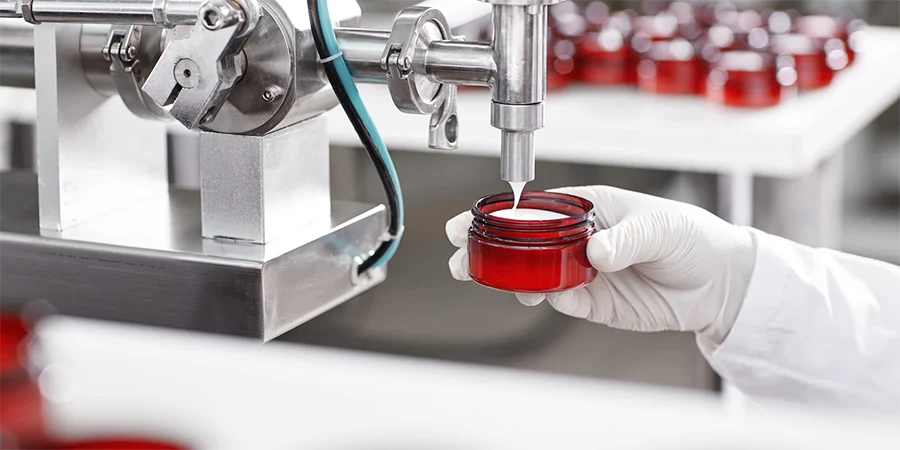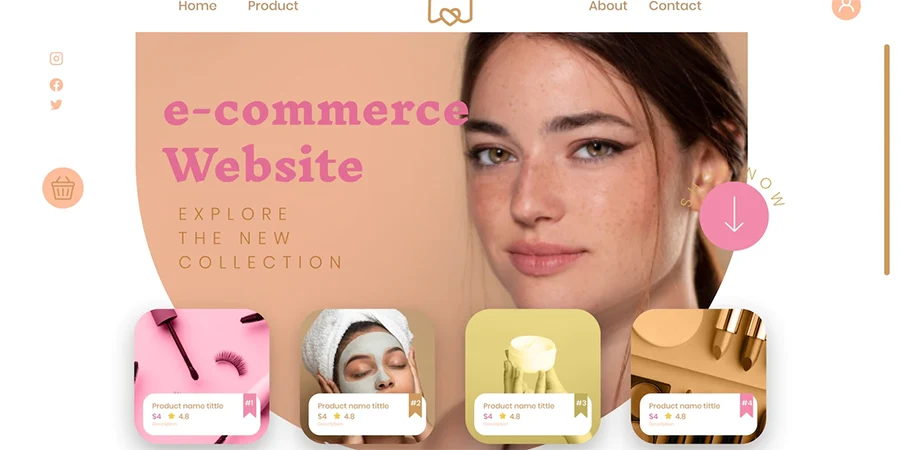A quick overview of the topics covered in this article.
Subscribe to the UKPACK newsletter to receive regular updates on the company, products, services, upcoming exhibitions and more.
Embarking on the journey of starting a skincare line can be both thrilling and fulfilling. The industry is experiencing a remarkable surge, driven by the escalating demand for top-notch skincare products, which indicates a promising potential for achievement.
Nevertheless, it is crucial to approach this endeavor with meticulous planning and thoughtful deliberation, ensuring a strong foundation for success.
The skincare industry’s immense profitability is evident as experts project its value to reach an astonishing $200.25 billion by 2025, presenting an extraordinary opportunity for aspiring entrepreneurs who are passionate about launching their own skincare brand.
This ultimate guide will take you through the essential steps involved in starting a skincare line, from conducting market research to establishing a strong online presence. So, let’s dive in and explore how to turn your skincare business dreams into a reality!
1. Do Research and Market Analysis

In the beauty industry, market research holds particular significance due to its saturation and rapidly changing trends. However, this dynamic and ever-evolving landscape also presents opportunities for aspiring entrepreneurs to launch their own skincare lines. Staying informed about trends through regular monitoring of beauty publications and influencers, as well as utilizing tools like Google Trends, can help validate ideas and identify potential market gaps.
In order to assess the feasibility of your idea, it is crucial to conduct comprehensive research encompassing competitive analysis, market research, and keyword research. Conducting market research will help you gain insights into consumer preferences, current trends, and potential competitors. This stage is also the opportune moment to delve into the financial aspect by crunching the numbers. Determining the initial startup costs and exploring potential funding options are vital considerations at this juncture.
2. Find Your Niche

The skincare industry encompasses a vast array of products, ranging from sunscreen and cleansers to makeup, moisturizers, and countless others. To succeed, it is important to narrow your focus and identify a specific market for the products you intend to offer.
Newcomers in the skincare industry can achieve success by recognizing and catering to audiences that are underserved by existing brands. A prime illustration of this can be seen in the cosmetics sector, where indie brands took the lead in introducing inclusive cosmetics designed for a wide range of skin tones.
By focusing on innovation rather than blindly following the crowd, indie skincare brands can avoid common pitfalls. Unlike established brands that cast a wide net, independent brands have the advantage of targeting a niche audience or addressing specific skincare concerns, which tend to change less frequently than trends.
While it is crucial to be vigilant in spotting emerging trends, it is equally important to be cautious of trends that may fade quickly and ensure that your business plan is sustainable in the long run.
Consider the specific types of products you wish to sell, such as exfoliators, creams, serums, moisturizers, acne treatments, or facial oils. Then, reflect on what sets your product apart and the kind of customer your unique selling point will attract.
To provide inspiration for your skincare line, here are several examples of niche markets within the skincare industry:
- Vegan skin care products: Catering to a particular dietary preference or lifestyle choice is a prevalent strategy to carve out a niche in the food industry. Similarly, this approach holds true in the skincare realm. The demand for cruelty-free and vegan beauty and skincare products is steadily rising, transitioning from being an exception to becoming the norm. By ensuring your products adhere to this standard from the start, you eliminate the need for future adjustments when the market inevitably calls for it.
- Natural skin care products: The clean beauty trend continues to gain momentum, indicating its enduring popularity. The wellness movement has extended its influence to skincare, with consumers becoming increasingly mindful of the ingredients applied on their skin, in addition to what they consume internally. If you aspire to launch a skincare line within this niche, it is crucial to meticulously manage your inventory and supply chain. Keep in mind that products devoid of synthetic preservatives may have a shorter shelf life and require careful attention to avoid spoilage.
- Luxury skin care products: Crafting luxurious products and treatments using premium ingredients is a hallmark of indulgence. Consider creating dermatologically tested solutions tailored to individuals with a higher budget, such as face masks enriched with genuine gold flakes.
3. Create Your Skincare Brand

Customers don’t merely develop an affinity for your product; they establish a connection with your brand and the unique identity you cultivate for your business.
Your skincare brand encompasses everything you employ to differentiate yourself from competitors. This encompasses not only your product line but also your packaging selections, brand colors, logo, and even your business name.
The following are the main steps involved in brand building:
Select a business name
When establishing your brand, the business name you select holds immense power in shaping its memorable characteristics. The ideal choice is one that not only reflects your brand values but also resonates deeply with your target audience. For instance, if you’re operating an organic skincare company, a name like “Organica Skincare” would aptly convey the essence of your brand.
Additionally, it is advisable to keep the name concise, easy to spell, and straightforward, ensuring it is effortless for customers to recall and share.
Moreover, before finalizing your choice, it is crucial to double-check the availability of the name to avoid potential conflicts or legal issues in the future.
Taking these factors into consideration when choosing your business name will contribute significantly to creating a strong and memorable brand identity.
Create a logo
In addition to your business name, your logo is often the initial brand element that customers identify with. A well-crafted logo has the ability to encapsulate the core values of your business within a single image.
For instance, a luxury skincare brand could incorporate shapes associated with opulence, such as diamonds, to evoke a sense of luxury and elegance. On the other hand, an organic brand may integrate natural shapes like leaves to signify its commitment to nature and sustainability.
By thoughtfully designing your logo to align with your brand identity, you can effectively communicate your values and create a lasting impression on your customers.
Design a skincare packaging
The packaging should be thoughtfully crafted to align with your brand identity, effectively communicating its essence and values. Whether it’s sleek and minimalistic for a modern brand or vibrant and whimsical for a youthful line, the packaging should evoke the desired emotions and resonate with your target audience.
At the same time, the packaging should prioritize functionality and product protection. It needs to be durable enough to withstand transportation and storage, ensuring that your products remain in optimal condition. Incorporating elements like secure closures, appropriate sizing, and protective materials will help maintain the integrity of your skincare items.
By striking the right balance between brand representation and product protection, your skincare packaging becomes a powerful tool in attracting customers, building trust, and enhancing the overall experience of your brand.
Read more:
4. Meet the Legal Requirements

Embarking on the journey of launching your own skincare line is undeniably thrilling. While you may be eager to dive into creating unique formulations and selecting the perfect packaging, it is essential to address certain legal aspects before moving forward.
To begin, familiarize yourself with the regulations outlined in the Food, Drugs, and Cosmetic Act (FD&C Act). This act serves as the foundation for the FDA’s oversight, ensuring that skincare products meet the necessary standards in terms of quality and safety. It is crucial that your products are deemed safe for consumer use and comply with proper labeling requirements.
If you plan to manufacture skincare products from your home, it is important to ensure adherence to the Cosmetic Good Manufacturing Practices checklist provided by the FDA. This checklist will assist you in establishing your manufacturing space in accordance with the established regulations for producing cosmetics from home.
Furthermore, it is essential to give thought to any licenses and documentation that may be necessary to safeguard your brand. If you find yourself uncertain about the suitable requirements for your business, it is advisable to consult with an attorney regarding the following:
- Professional liability and product liability insurance
- Licensing for cosmetics and skincare products (along with any professional licensing required for related services)
- Certifications pertaining to health and safety standards
By proactively addressing these legalities, you lay a solid foundation for your skincare business, ensuring compliance with regulations and protecting both your brand and the well-being of your customers.
5. Find Manufacturers for Skincare Packaging and Skincare Products

Skincare packaging manufacturer
When searching for a skincare packaging manufacturer, there are several important factors to consider in order to find a reliable and suitable partner for your business. Here are some key steps to guide you:
- Define your packaging requirements: Determine the specific packaging needs for your skincare products. Consider factors such as the type of packaging (e.g., bottles, jars, tubes), materials (e.g., glass, plastic), sizes, shapes, labeling options, and any special features you may require.
- Research potential manufacturers: Conduct thorough research to identify potential skincare packaging manufacturers. Explore industry directories, online platforms, trade shows, and forums to discover reputable companies with a track record in producing high-quality skincare packaging.
- Evaluate manufacturing capabilities: Assess the manufacturing capabilities of each potential manufacturer. Look for their expertise in skincare packaging production, their range of available packaging options, production capacity, quality control processes, and compliance with industry standards and regulations. Request samples to evaluate the quality, durability, and aesthetics of their packaging solutions.
- Consider sustainability: If sustainability is a priority for your brand, look for manufacturers that offer eco-friendly packaging options. Inquire about their use of recycled materials, biodegradable or compostable packaging, and their commitment to sustainable practices throughout the production process.
- Request quotes and negotiate terms: Reach out to the shortlisted manufacturers and request detailed quotes based on your packaging requirements. Compare pricing, minimum order quantities, lead times, customization options, and any additional services they provide. Negotiate terms that align with your budget and production needs.
- Assess communication and reliability: Evaluate the manufacturer’s communication responsiveness and reliability. Timely and effective communication is crucial throughout the production process, so ensure they can address your inquiries, provide updates, and address any concerns promptly.
- Visit the facilities or request audits: If feasible, consider visiting the manufacturer’s facilities to assess their production capabilities, quality control measures, and overall operations. Alternatively, you may request audits or certifications to ensure their compliance with industry standards.
- Seek references and reviews: Ask for references or look for customer reviews and testimonials to gain insights into the manufacturer’s reputation, reliability, and customer satisfaction. This feedback can provide valuable information to help you make an informed decision.
- Establish a partnership: Once you have chosen a skincare packaging manufacturer, establish a clear agreement that outlines specifications, quality standards, delivery schedules, payment terms, and any other relevant details. Maintain open lines of communication to foster a collaborative and successful partnership.
By the way, UKPACK is a renowned and trusted skincare packaging manufacturer based in China, known for its exceptional quality and extensive range of packaging solutions. With years of experience in the industry, UKPACK has established itself as a leader in delivering innovative and reliable packaging options for skincare products.
Skincare product manufacturer
Unless you’re producing all of your skincare products yourself, finding a reliable manufacturer is crucial. Choosing the right manufacturer can alleviate a significant burden as you embark on designing your own skincare line.
A reputable manufacturer possesses the ability to produce your products in large quantities, efficiently, and in compliance with the highest regulatory standards. This allows you to shift your focus towards building your brand while ensuring your products are manufactured with precision. However, it’s important to ensure that you select a company that instills trust and confidence.
In the United States, there are numerous companies specializing in made-to-order skincare products, including:
- Botanic Beauty Labs
- Skin Pro Inc.
- GDMI Inc.
- Schwartz Natural Cosmetics
These companies have established themselves as trusted manufacturers within the industry, offering expertise in skincare product formulation, manufacturing capabilities, and adherence to quality standards. When choosing a manufacturer, consider factors such as their track record, reputation, and ability to meet your specific production requirements. By partnering with a reliable manufacturer, you can streamline the manufacturing process and have peace of mind, knowing that your skincare products are being produced with professionalism and excellence.
6. Ensure Rigorous Testing for Your Skin Care Formulations

When it comes to your skin care formulations, it is of utmost importance to prioritize and ensure rigorous testing. Thorough testing plays a critical role in validating the safety, efficacy, and overall quality of your products.
By subjecting your skin care formulations to comprehensive testing, you can gain valuable insights into their performance, stability, and potential reactions. This process involves conducting various tests and assessments, including but not limited to:
- Safety Testing: Evaluate the compatibility of your formulations with different skin types to ensure they are non-irritating and hypoallergenic. Assess the absence of harmful substances and verify compliance with regulatory guidelines.
- Efficacy Testing: Determine the effectiveness of your skin care products by conducting clinical trials or in vitro studies. Measure parameters such as moisturization, wrinkle reduction, skin firmness, and other targeted benefits to validate the efficacy claims of your formulations.
- Stability Testing: Assess the shelf life and stability of your products under various conditions, including temperature, humidity, and light exposure. This helps ensure that your formulations maintain their desired properties and performance throughout their recommended usage period.
- Microbiological Testing: Verify the microbial safety of your products by conducting tests to detect the presence of harmful bacteria, yeast, and molds. This helps prevent contamination and ensures the preservation of your products.
- Compatibility Testing: Assess the compatibility of your formulations with packaging materials to prevent any adverse interactions that could affect product integrity or safety.
By investing in rigorous testing, you can provide your customers with confidence in the safety, efficacy, and quality of your skin care formulations. It also allows you to identify any potential issues early on, enabling you to make necessary improvements and adjustments before your products reach the market.
Working with reputable laboratories or testing facilities, experienced in skin care product testing, can provide you with reliable results and expert guidance throughout the testing process. Remember, the thorough testing of your skin care formulations is a crucial step towards delivering products that meet the highest standards and exceed customer expectations.
7. Build an Online Store

Once your products and brand are prepared for the market, it is imperative to establish an online store. In this era of advanced technology, it is crucial to have a robust online presence to ensure the prosperity of your skincare line. Develop an attractive website that effectively highlights your brand and products. Employ efficient search engine optimization (SEO) techniques to enhance the visibility of your website. Utilize social media platforms and content marketing to engage with your target audience.
8. Market and Promote Your Skincare Line

It’s time to reach the right audience with your products.
As the skincare industry continues to expand, there is fierce competition for emerging brands. A well-crafted marketing strategy is essential to stand out from the competition and capture the attention of potential customers who can benefit the most from your product.
Utilize your user personas to consider which marketing materials are most likely to resonate with your target audience and determine the platforms where they are most likely to encounter your campaigns. For example, younger audiences tend to seek skincare products on TikTok, whereas older demographics might prefer traditional TV or Facebook advertisements.
Once you have identified the optimal platforms for your ads, explore effective strategies that have proven to make a difference in the beauty and skincare industry:
- Social proof: It is widely known that people rely on product reviews before making a purchase. Encourage your existing customers to share their feedback and testimonials about your skincare products, as this will help persuade other potential clients of the value and efficacy of your offerings.
- Influencer marketing: Collaborating with the right influencers can instantly enhance the credibility of your brand. Identify individuals whom your target customers already trust online and seek partnership opportunities with them. You can provide your influencer partners with complimentary products in exchange for honest reviews, or team up with complementary beauty brands for competitions and giveaways, leveraging trust through association.
- User-generated content: Today’s consumers tend to be skeptical of brands. Before clients feel confident enough to try your skincare product, they often seek evidence of others using and benefiting from it. Reposting photos of satisfied customers wearing your facemasks or sharing videos of clients using your moisturizer can serve as compelling social proof. Incorporating user-generated content not only enhances credibility but also strengthens your reputation as a business.
Take note of your customers’ reactions to your campaigns to identify which initiatives are deserving of further investment.
9. Customer Relationship Management

Delivering exceptional customer service is paramount in building trust and fostering loyalty among your clientele. One of the key aspects of exceptional customer service is ensuring prompt responses to customer inquiries and addressing their concerns effectively. By providing timely and helpful assistance, you demonstrate your commitment to their satisfaction and showcase your brand’s dedication to customer care.
Encouraging feedback from your customers is another vital component of exceptional customer service. Actively seek out their opinions and experiences with your products and brand. By creating an open and welcoming environment for feedback, you can gather valuable insights and use them to enhance both your products and overall customer experience. This iterative process of incorporating customer feedback helps you continually refine and improve your offerings to better meet their needs and preferences.
Moreover, building strong relationships with your customers is a cornerstone of exceptional customer service. Cultivate a genuine connection by engaging with them on various platforms, such as social media, email, or even in-person interactions. Show appreciation for their support and loyalty, and go the extra mile to exceed their expectations. By fostering these relationships, you not only create brand advocates who will passionately promote your products to others, but you also establish a loyal customer base that is more likely to engage in repeat business.
Remember, exceptional customer service is a continuous effort that requires ongoing commitment and attentiveness. Regularly assess and refine your customer service strategies to ensure they align with evolving customer expectations. By consistently delivering outstanding service and building strong relationships, you can establish a reputation for excellence and create a loyal customer base that will contribute to the long-term success and growth of your brand.
10. Financial Management

Create a comprehensive budget to track your expenses and revenue. Monitor your financial performance regularly and make data-driven decisions. Seek investment opportunities, such as securing funding or partnering with investors, to support your growth plans. Effective financial management is crucial for the long-term success of your skincare line.
Conclusion
Starting a skincare line can be a fulfilling journey that allows you to share your passion for skincare with the world. By following this ultimate guide, you have gained insights into the essential steps involved in starting a skincare line, from research and formulation to marketing and financial management. Remember to stay dedicated, adapt to market changes, and continue innovating to thrive in the competitive skincare industry.
Frequently Asked Questions
Q1. How much does it cost to start a skincare line?
Establishing your own skincare brand necessitates an initial investment, the magnitude of which typically hinges upon the nature of the business you intend to operate. Expenses generally span from approximately $2,000 to $20,000, contingent upon factors such as your product assortment, volume of orders, packaging specifications, and other variables.
Additionally, it is important to consider the expenditure associated with branding endeavors, including logo creation and website design. When engaging with a manufacturer, it is advisable to inquire about potential minimum order prerequisites, as certain companies may stipulate the purchase of numerous units, often in the range of dozens or hundreds, in a single transaction.
Q2. How to price my skin care products?
Calculate your expenses by combining the production costs, overhead costs, and desired profit margin. Examine the pricing strategies employed by your competitors to ensure that your products fall within a reasonable range in the market. Experiment with different price points on your website to determine the optimal balance between profitability and sales volume.
Q3. Should I focus on a niche market or cater to a broader audience?
Both strategies have their advantages. Niche markets allow you to target specific customer needs, while catering to a broader audience provides a larger customer base. Research your target market and evaluate your resources to determine the best approach for your skincare line.
Q4. How long does it take to launch a skincare line?
The timeline can vary based on individual circumstances, including product development, branding, and legal processes. It’s important to set realistic expectations and allow sufficient time for each step of the process.
Q5. Do I need a background in skincare or chemistry to start a skincare line?
While a background in skincare or chemistry can be beneficial, it’s not mandatory. Collaborating with experts and conducting thorough research will help you navigate the technical aspects of formulating and developing skincare products.

Content Manager at UKPACK. I have extensive experience in the packaging industry and specialize in creating engaging content. I’m passionate about staying ahead of industry trends.
Is Glass Considered Biodegradeable Material? A Comprehensive Look at Its Environmental Role
Hey there! Have you ever found yourself digging through your recycling bin, pondering whether your glass bottle is a friend or foe to the environment? As we become more [...]
Can I Mix Water And Conditioner In My Spray Bottle
Have you ever felt your hair was missing a little moisture throughout the day? Mixing water and conditioner in a spray bottle can be a simple, effective way to [...]
How to Make Your Spray Bottle Mist Rather Than Spray
When it comes to spray bottles, sometimes you need that gentle, even mist rather than a strong spray. Whether it’s watering plants, adding a finishing touch to your hairstyle, [...]




